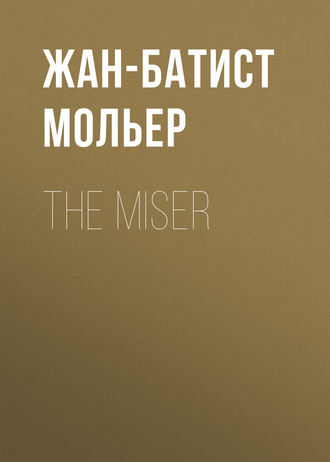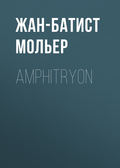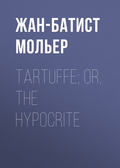
Мольер (Жан-Батист Поклен)
The Miser
SCENE II. – HARPAGON, MARIANNE, ÉLISE, FROSINE
Har. (aside, and without being seen). Ah! ah! my son is kissing the hand of his intended stepmother, and his intended stepmother does not seem much averse to it! Can there be any mystery in all this?
Eli. Here comes my father.
Har. The carriage is quite ready, and you can start when you like.
Cle. Since you are not going, father, allow me to take care of them.
Har. No, stop here; they can easily take care of themselves, and I want you.
SCENE III. – HARPAGON, CLÉANTE
Har. Well, now, all consideration of stepmother aside, tell me what do you think of this lady?
Cle. What I think of her?
Har. Yes, what do you think of her appearance, her figure, her beauty and intelligence?
Cle. So, so.
Har. But still?
Cle. To tell you the truth, I did not find her such as I expected. Her manner is that of a thorough coquette, her figure is rather awkward, her beauty very middling, and her intelligence of the meanest order. Do not suppose that I say this to make you dislike her; for if I must have a stepmother, I like the idea of this one as well as of any other.
Har. You spoke to her just now, nevertheless…
Cle. I paid her several compliments in your name, but it was to please you.
Har. So then you don't care for her?
Cle. Who? I? Not in the least.
Har. I am sorry for it, for that puts an end to a scheme which had occurred to me. Since I have seen her here, I have been thinking of my own age; and I feel that people would find fault with me for marrying so young a girl. This consideration had made me determine to abandon the project, and as I had demanded her in marriage, and had given her my promise, I would have given her to you if it were not for the dislike you have for her.
Cle. To me?
Har. To you.
Cle. In marriage?
Har. In marriage.
Cle. It is true she is not at all to my taste; but, to please you, father, I will bring myself to marry her, if you please.
Har. If I please! I am more reasonable than you think. I don't wish to compel you.
Cle. Excuse me! I will make an attempt to love her.
Har. No, no; a marriage cannot be happy where there is no love.
Cle. That, my father, will, perhaps, come by and by, and it is said that love is often the fruit of marriage.
Har. No, it is not right to risk it on the side of the man, and there are some troublesome things I don't care to run the chance of. If you had felt any inclination for her, you should have married her instead of me, but as it is, I will return to my first intention and marry her myself.
Cle. Well, father, since things are so, I had better be frank with you, and reveal our secret to you. The truth is that I have loved her ever since I saw her one day on the promenade. I intended to ask you today to let me marry her, and I was only deterred from it because you spoke of marrying her, and because I feared to displease you.
Har. Have you ever paid her any visits?
Cle. Yes, father.
Har. Many?
Cle. Yes; considering how long we have been acquainted.
Har. You were well received.
Cle. Very well, but without her knowing who I was; and that is why Marianne was so surprised when she saw me today.
Har. Have you told her of your love, and of your intention of marrying her?
Cle. Certainly, and I also spoke a little to the mother on the subject.
Har. Did she kindly receive your proposal for her daughter?
Cle. Yes, very kindly.
Har. And does the daughter return your love?
Cle. If I can believe appearances, she is certainly well disposed towards me.
Har. (aside). Well! I am very glad to have found out this secret; it is the very thing I wanted to know. (To his son) Now, look here, my son, I tell you what. You will have, if you please, to get rid of your love for Marianne, to cease to pay your attentions to a person I intend for myself, and to marry very soon the wife I have chosen for you.
Cle. So, father, it is thus you deceive me! Very well, since things are come to such a pass, I openly declare to you that I shall not give up my love for Marianne. No! understand that henceforth there is nothing from which I shall shrink in order to dispute her with you; and if you have on your side the consent of the mother, perhaps I shall have some other resources left to aid me.
Har. What, rascal! You dare to trespass on my grounds?
Cle. It is you who trespass on mine. I was the first.
Har. Am I not your father, and do you not owe me respect?
Cle. There are things in which children are not called upon to pay deference to their fathers; and love is no respector of persons.
Har. My stick will make you know me better.
Cle. All your threatenings are nothing to me.
Har. You will give up Marianne?
Cle. Never!
Har. Bring me my stick. Quick, I say! my stick!
SCENE IV. – HARPAGON, CLÉANTE, MASTER JACQUES
Jac. Hold! hold! Gentlemen, what does this mean? What are you thinking of?
Cle. I don't care a bit for it.
Jac. (to Cléante). Ah! Sir, gently.
Har. He dares to speak to me with such impudence as that!
Jac. (to Harpagon). Ah! Sir, I beg of you.
Cle. I shall keep to it.
Jac. (to Cléante). What! to your father?
Har. Let me do it.
Jac. (to Harpagon). What! to your son? To me it's different.
Har. I will make you judge between us, Master Jacques, so that you may see that I have right on my side.
Jac. Willingly. (To Cléante) Go a little farther back.
Har. There is a young girl I love and want to marry, and the scoundrel has the impudence to love her also, and wants to marry her in spite of me.
Jac. Oh! he is wrong.
Har. Is it not an abominable thing to see a son who does not shrink from becoming the rival of his father? And is it not his bounden duty to refrain from interfering with my love?
Jac. You are quite right; stop here, and let me go and speak to him.
Cle. (to Master Jacques, who comes near him). Very well; if he wants to make you a judge between us, I have no objection. I care little who it is, and I don't mind referring our quarrel to you.
Jac. You do me great honour.
Cle. I am in love with a young girl who returns my affection, and who receives kindly the offer of my heart; but my father takes it into his head to disturb our love by asking her in marriage.
Jac. He certainly is wrong.
Cle. Is it not shameful for a man of his age to think of marrying? I ask you if it is right for him to fall in love? and ought he not now to leave that to younger men?
Jac. You are quite right; he is not serious; let me speak a word or two to him. (To Harpagon) Really, your son is not so extravagant as you think, and is amenable to reason. He says that he is conscious of the respect he owes you, and that he only got angry in the heat of the moment. He will willingly submit to all you wish if you will only promise to treat him more kindly than you do, and will give him in marriage a person to his taste.
Har. Ah! tell him, Master Jacques, that he will obtain everything from me on those terms, and that, except Marianne, I leave him free to choose for his wife whomsoever he pleases.
Jac. Leave that to me. (To Cléante) Really, your father is not so unreasonable as you make him out to me; and he tells me that it is your violence which irritated him. He only objects to your way of doing things, and is quite ready to grant you all you want, provided you will use gentle means and will give him the deference, respect, and submission that a son owes to his father.
Cle. Ah! Master Jacques, you can assure him that if he grants me Marianne, he will always find me the most submissive of men, and that I shall never do anything contrary to his pleasure.
Jac. (to Harpagon). It's all right; he consents to what you say.
Har. Nothing could be better.
Jac. (to Cléante). It's all settled; he is satisfied with your promises.
Cle. Heaven be praised!
Jac. Gentlemen, you have nothing to do but to talk quietly over the matter together; you are agreed now, and yet you were on the point of quarrelling through want of understanding each other.
Cle. My poor Jacques, I shall be obliged to you all my life.
Jac. Don't mention it, Sir.
Har. You have given me great pleasure, Master Jacques, and deserve a reward. (Harpagon feels in his pocket, Jacques holds out his hand, but Harpagon only pulls out his handkerchief, and says,) Go; I will remember it, I promise you.
Jac. I thank you kindly, Sir.
SCENE V. – HARPAGON, CLÉANTE
Cle. I beg your pardon, father, for having been angry.
Har. It is nothing.
Cle. I assure you that I feel very sorry about it.
Har. I am very happy to see you reasonable again.
Cle. How very kind of you so soon to forget my fault.
Har. One easily forgets the faults of children when they return to their duty.
Cle. What! you are not angry with me for my extravagant behaviour?
Har. By your submission and respectful conduct you compel me to forget my anger.
Cle. I assure you, father, I shall for ever keep in heart the remembrance of all your kindness.
Har. And I promise you that, in future, you will obtain all you like from me.
Cle. Oh, father! I ask nothing more; it is sufficient for me that you give me Marianne.
Har. What?
Cle. I say, father, that I am only too thankful already for what you have done, and that when you give me Marianne, you give me everything.
Har. Who talks of giving you Marianne?
Cle. You, father.
Har. I?
Cle. Yes.
Har. What! is it not you who promised to give her up?
Cle. I! give her up?
Har. Yes.
Cle. Certainly not.
Har. Did you not give up all pretensions to her?
Cle. On the contrary, I am more determined than ever to have her.
Har. What, scoundrel! again?
Cle. Nothing can make me change my mind.
Har. Let me get at you again, wretch!
Cle. You can do as you please.
Har. I forbid you ever to come within my sight.
Cle. As you like.
Har. I abandon you.
Cle. Abandon me.
Har. I disown you.
Cle. Disown me.
Har. I disinherit you.
Cle. As you will.
Har. I give you my curse.
Cle. I want none of your gifts.
SCENE VI. – CLÉANTE, LA FLÈCHE
La Fl. (leaving the garden with a casket). Ah! Sir, you are just in the nick of time. Quick! follow me.
Cle. What is the matter?
La Fl. Follow me, I say. We are saved.
Cle. How?
La Fl. Here is all you want.
Cle. What?
La Fl. I have watched for this all day.
Cle. What is it?
La Fl. Your father's treasure that I have got hold of.
Cle. How did you manage it?
La Fl. I will tell you all about it. Let us be off. I can hear him calling out.
SCENE VII. – HARPAGON, from the garden, rushing in without his hat, and crying—
Thieves! thieves! assassins! murder! Justice, just heavens! I am undone; I am murdered; they have cut my throat; they have stolen my money! Who can it be? What has become of him? Where is he? Where is he hiding himself? What shall I do to find him? Where shall I run? Where shall I not run? Is he not here? Who is this? Stop! (To himself, taking hold of his own arm) Give me back my money, wretch… Ah…! it is myself… My mind is wandering, and I know not where I am, who I am, and what I am doing. Alas! my poor money! my poor money! my dearest friend, they have bereaved me of thee; and since thou art gone, I have lost my support, my consolation, and my joy. All is ended for me, and I have nothing more to do in the world! Without thee it is impossible for me to live. It is all over with me; I can bear it no longer. I am dying; I am dead; I am buried. Is there nobody who will call me from the dead, by restoring my dear money to me, or by telling me who has taken it? Ah! what is it you say? It is no one. Whoever has committed the deed must have watched carefully for his opportunity, and must have chosen the very moment when I was talking with my miscreant of a son. I must go. I will demand justice, and have the whole of my house put to the torture – my maids and my valets, my son, my daughter, and myself too. What a crowd of people are assembled here! Everyone seems to be my thief. I see no one who does not rouse suspicion in me. Ha! what are they speaking of there? Of him who stole my money? What noise is that up yonder? Is it my thief who is there? For pity's sake, if you know anything of my thief, I beseech you to tell me. Is he hiding there among you? They all look at me and laugh. We shall see that they all have a share in the robbery. Quick! magistrates, police, provosts, judges, racks, gibbets, and executioners. I will hang everybody, and if I do not find my money, I will hang myself afterwards.
ACT V
SCENE I. – HARPAGON, A POLICE OFFICER
Off. Leave that to me. I know my business. Thank Heaven! this is not the first time I have been employed in finding out thieves; and I wish I had as many bags of a thousand francs as I have had people hanged.
Har. Every magistrate must take this affair in hand; and if my money is not found, I shall call justice against justice itself.
Off. We must take all needful steps. You say there was in that casket…?
Har. Ten thousand crowns in cash.
Off. Ten thousand crowns!
Har. Ten thousand crowns.
Off. A considerable theft.
Har. There is no punishment great enough for the enormity of the crime; and if it remain unpunished, the most sacred things are no longer secure.
Off. In what coins was that sum?
Har. In good louis d'or and pistoles of full weight.
Off. Whom do you suspect of this robbery?
Har. Everybody. I wish you to take into custody the whole town and suburbs.
Off. You must not, if you trust me, frighten anybody, but must use gentle means to collect evidence, in order afterwards to proceed with more rigour for the recovery of the sum which has been taken from you.
SCENE II. – HARPAGON, THE POLICE OFFICER, MASTER JACQUES
Jac. (at the end of the stage, turning back to the door by which he came in). I am coming back. Have his throat cut at once; have his feet singed; put him in boiling water, and hang him up to the ceiling.
Har. What! Him who has robbed me?
Jac. I was speaking of a sucking pig that your steward has just sent me; and I want to have it dressed for you after my own fancy.
Har. This is no longer the question; and you have to speak of something else to this gentleman.
Off. (to Jacques). Don't get frightened. I am not a man to cause any scandal, and matters will be carried on by gentle means.
Jac. (to Harpagon). Is this gentleman coming to supper with you?
Off. You must, in this case, my good man, hide nothing from your master.
Jac. Indeed, Sir, I will show you all I know, and will treat you in the best manner I possibly can.
Off. That's not the question.
Jac. If I do not give as good fare as I should like, it is the fault of your steward, who has clipped my wings with the scissors of his economy.
Har. R ascal! We have other matters to talk about than your supper; and I want you to tell me what has become of the money which has been stolen from me.
Jac. Some money has been stolen from you?
Har. Yes, you rascal! And I'll have you hanged if you don't give it me back again.
Off. (to Harpagon). Pray, don't be hard upon him. I see by his looks that he is an honest fellow, and that he will tell you all you want to know without going to prison. Yes, my friend, if you confess, no harm shall come to you, and you shall be well rewarded by your master. Some money has been stolen from him, and it is not possible that you know nothing about it.
Jac. (aside). The very thing I wanted in order to be revenged of our steward. Ever since he came here, he has been the favourite, and his advice is the only one listened to. Moreover, I have forgotten neither the cudgelling of to-day nor …
Har. What are you muttering about there?
Off. (to Harpagon). Leave him alone. He is preparing himself to satisfy you; I told you that he was an honest fellow.
Jac. Sir, since you want me to tell you what I know, I believe it is your steward who has done this.
Har. Valère?
Jac. Yes.
Har. He who seemed so faithful to me!
Jac. Himself. I believe that it is he who has robbed you.
Har. And what makes you believe it?
Jac. What makes me believe it?
Har. Yes.
Jac. I believe it … because I believe it.
Off. But you must tell us the proofs you have.
Har. Did you see him hanging about the place where I had put my money?
Jac. Yes, indeed. Where was your money?
Har. In the garden.
Jac. Exactly; I saw him loitering about in the garden; and in what was your money?
Har. In a casket.
Jac. The very thing. I saw him with a casket.
Har. And this casket, what was it like? I shall soon see if it is mine.
Jac. What it was like?
Har. Yes.
Jac. It was like … like a casket.
Off. Of course. But describe it a little, to see if it is the same.
Jac. It was a large casket.
Har. The one taken from me is a small one.
Jac. Yes, small if you look at it in that way; but I call it large because of what it contains.
Har. And what colour was it?
Jac. What colour?
Off. Yes.
Jac. Of a colour … of a certain colour… Can't you help me to find the word?
Har. Ugh!
Jac. Red; isn't it?
Har. No, grey.
Jac. Ha! yes, reddish-grey! That's what I meant.
Har. There is no doubt about it, it's my casket for certain. Write down his evidence, Sir! Heavens! whom can we trust after that? We must never swear to anything, and I believe now that I might rob my own self.
Jac. (to Harpagon). There he is coming back, Sir; I beg of you not to go and tell him that it was I who let it all out, Sir.







